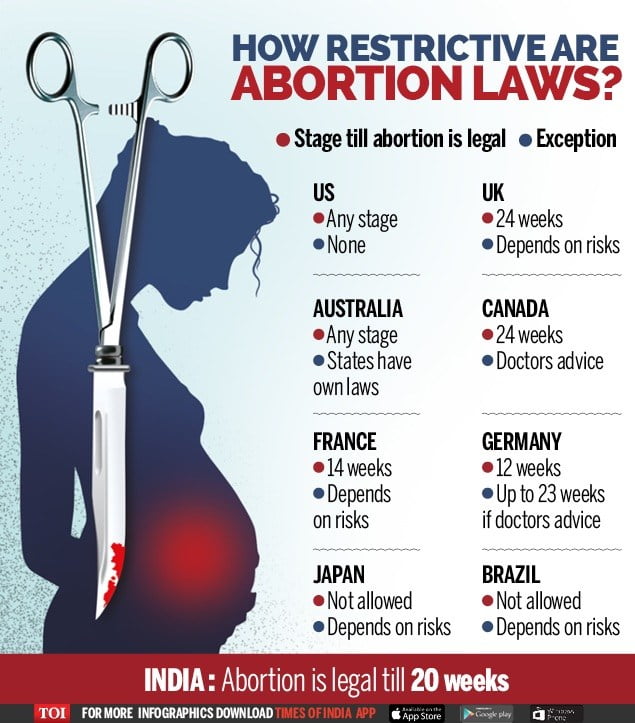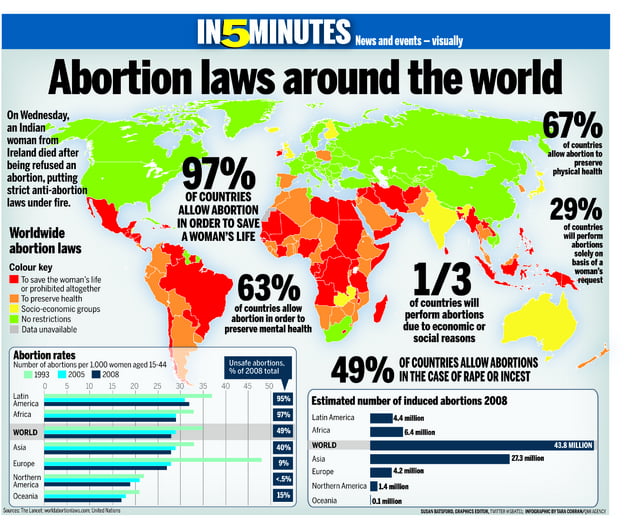The Modi Government has brought in some radical changes to India’s 49-year-old abortion law with the Union Cabinet chaired by Prime Minister himself, approving amendments to the Medical Termination of Pregnancy Act 1971.
The MTP Amendment Bill-2020, to be tabled in the Budget Session today, significantly relaxes abortion conditions for vulnerable women, including victims of sexual violence who can’t abort unwanted foetuses due to time constraints the current law imposes.
Then & Now
- Under the 1971 Act, surgical abortion of foetuses beyond 20 weeks is illegal
- The amended Bill, however, allows victims of rape and incest; minors; and differently abled and other vulnerable women to abort foetuses with upper gestation age limit of 24 weeks instead of 20 weeks
- In another change, the new Bill scraps the upper gestation age limit for abortion in cases of abnormal foetuses that are incompatible with life and pose a risk to the mother

The amendment Bill says,
Upper gestation limit will not to apply in cases of substantial foetal abnormalities diagnosed by Medical Board. The composition, functions and other details of Medical Board will be prescribed subsequently in Rules under the Act.
Also name and other particulars of a woman whose pregnancy has been terminated shall not be revealed except to a person authorises in any law for the time being in force.
The Health Ministry today said the relaxation from 20 to 24 weeks was being made for special categories of women to be defined in the amendments to MTP Rules and would include vulnerable women such as survivors of rape, victims of incest, differently-abled women and minors.
The Bill also proposes the requirement for opinion of one health provider for termination of pregnancy up to 20 weeks of gestation (instead of up to 12 weeks as mentioned in the 1971 law) and opinion of two health providers for termination of pregnancy of 20 to 24 weeks of gestation.
The idea behind the law is to ensure dignity, autonomy, confidentiality and justice for women who need to terminate pregnancy. The new Bill also accepts “failure of contraceptive” as a legal reason for abortion in cases of unmarried women.

Union Minister Prakash Javadekar said,
In a progressive reform and giving reproductive rights to women, the limit of 20 weeks of medical termination of pregnancy has been increased to 24 weeks. This is important because in the first 5 months there are cases where the girl concerned doesn’t realize and has to go to court. This was discussed with various stakeholders.
Currently, cases in which the pregnancy is beyond 20 weeks go to court and are decided on a case-by-case basis. In 2017, the top court allowed a 13-year-old girl in Mumbai abortion at 32 weeks. The exceptions will continue to happen even after the amendment, but the limit of 24 will mean that fewer cases go to court.
Abortions are conditional in India. They are offered only after rape and according to data, about 90 cases are logged each day. If there is serious danger to a mother, substantial risk of disability to a child or if contraceptive fails, abortions are permitted.
In Rape Cases
An increasing number of women and girls, including high-profile child rape victims, have sought court permission for later abortions. Usually the requests came when a pregnancy is discovered late or poses a risk to either mother or foetus.
The cabinet’s decision came after the federal government told the Supreme Court in September that the 20-week limit could not be changed, saying a foetus’s right to life transcended all other rights.
But campaigners have long demanded an extension, saying the 1971 law is archaic and ignores medical advances. They said the 20-week limit forces some women and girls to seek out unsafe, illegal ways to end their pregnancies.
Our Take:
While the above is a welcome move for several women who suffer due to heinous crimes such as rape and sexual assaults, the burden on courts will also be reduced to a great extent. At the same time, married women should not misuse this law again for frivolous reasons, in case they unilaterally decide to abort the baby if there are cracks in the marriage. In such scenarios, government must make it mandatory for the doctors to decide whether the abortion is strictly due to medical conditions or just because the woman decides otherwise.
Every law is prone to misuse, that doesn’t mean we don’t amend or make new laws. However, it is important to tighten the ‘loopholes of misuse’ for each law, which could perhaps make it lose it’s real objective.
ALSO READ –
https://voiceformenindia.com/in-the-social/daughter-takes-mum-on-her-honeymoon-few-months-later-mother-is-pregnant-with-son-in-law-uk/
Follow www.mensdayout.com on Facebook, Twitter and Instagram
Join our Facebook Group or follow us on social media by clicking on the icons below
If you find value in our work, you may choose to donate to Voice For Men Foundation via Milaap OR via UPI: voiceformenindia@hdfcbank (80G tax exemption applicable)































